
|
Astronomy Picture Of the Day (APOD)
 Apollo 11 Landing Panorama
Apollo 11 Landing Panorama
19.07.2024
Have you seen a panorama from another world lately? Assembled from high-resolution scans of the original film frames, this one sweeps across the magnificent desolation of the Apollo 11 landing site on the Moon's Sea of Tranquility.
 Anticrepuscular Rays at the Planet Festival
Anticrepuscular Rays at the Planet Festival
18.07.2024
For some, these subtle bands of light and shadow stretched across the sky as the Sun set on July 11. Known as anticrepuscular rays, the bands are formed as a large cloud bank near the western horizon cast long shadows through the atmosphere at sunset.
 Messier 24: Sagittarius Star Cloud
Messier 24: Sagittarius Star Cloud
17.07.2024
Unlike most entries in Charles Messier's famous catalog of deep sky objects, M24 is not a bright galaxy, star cluster, or nebula. It's a gap in nearby, obscuring interstellar dust clouds that allows a view of the distant stars in the Sagittarius spiral arm of our Milky Way galaxy.
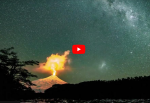 APOD: 2024 July 17 Б Villarrica Volcano Against the Sky
APOD: 2024 July 17 Б Villarrica Volcano Against the Sky
16.07.2024
When Vulcan, the Roman god of fire, swings his blacksmith's hammer, the sky is lit on fire. A recent eruption of Chile's Villarrica volcano shows the delicate interplay between this fire -- actually...
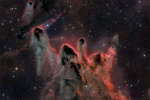 APOD: 2024 July 16 Б Cometary Globules
APOD: 2024 July 16 Б Cometary Globules
15.07.2024
What are these unusual interstellar structures? Bright-rimmed, flowing shapes gather near the center of this rich starfield toward the borders of the nautical southern constellations Pupis and Vela. Composed of interstellar gas and dust, the grouping of light-year sized cometary globules is about 1300 light-years distant.
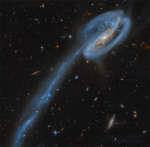 APOD: 2024 July 15 Б The Tadpole Galaxy from Hubble
APOD: 2024 July 15 Б The Tadpole Galaxy from Hubble
14.07.2024
Why does this galaxy have such a long tail? In this stunning vista, based on image data from the Hubble Legacy Archive, distant galaxies form a dramatic backdrop for disrupted spiral galaxy Arp 188, the Tadpole Galaxy. The cosmic tadpole is a mere 420 million light-years distant toward the northern constellation of the Dragon (Draco).
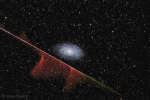 APOD: 2024 July 14 Б Meteor Misses Galaxy
APOD: 2024 July 14 Б Meteor Misses Galaxy
13.07.2024
The galaxy was never in danger. For one thing, the Triangulum galaxy (M33), pictured, is much bigger than the tiny grain of rock at the head of the meteor. For another, the galaxy is much farther away -- in this instance 3 million light years as opposed to only about 0.0003 light seconds.
12.07.2024
In 1990, cruising four billion miles from the Sun, the Voyager 1 spacecraft looked back to make this first ever Solar System family portrait. The complete portrait is a 60 frame mosaic made from a vantage point 32 degrees above the ecliptic plane.
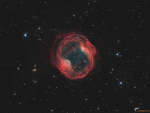 Jones Emberson 1
Jones Emberson 1
11.07.2024
Planetary nebula Jones-Emberson 1 is the death shroud of a dying Sun-like star. It lies some 1,600 light-years from Earth toward the sharp-eyed constellation Lynx. About 4 light-years across, the expanding remnant...
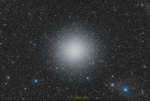 Globular Cluster Omega Centauri
Globular Cluster Omega Centauri
10.07.2024
Globular star cluster Omega Centauri packs about 10 million stars much older than the Sun into a volume some 150 light-years in diameter. Also known as NGC 5139, at a distance...
|
January February March April May June July August September October November |
|||||||||||||||||||||||||||||||||||||||||||||||||